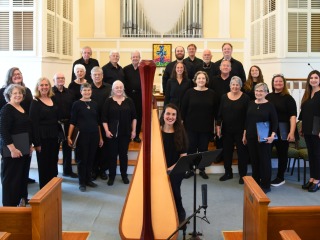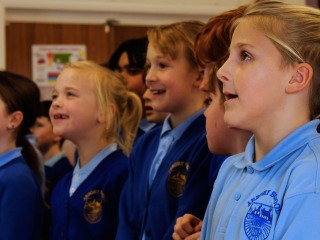MENU
16 Sep 2013
"MANY OLD MANKS AIRS"
ANNE McWHANNELL'S LOST MANUSCRIPT BOOK
by Stephen Miller, Vienna
In 1895, James McWhannell wrote to Deemster J.F. Gill, a truly remarkable letter, one that opens so: “My dear old Mother had a Manuscript book containing many old Manks airs[.] She was a perfect musician and set the words to the tunes as sung by the folks in our neighborhood.” But what had become of his book? “Unfortunately I cannot say to which of my Sisters was given the Music but if you see Mr. R. Corlett, Craig I think my Sister will be able to give you information[.]”
McWhannell’s mother was Anne McWhannell (née Gilchrist) who died in December 1876, aged eighty years of age according to the burial register for Lezayre, and was interred on the fifteenth of that month which would make her year of birth to be 1796. In the 1871 census, she was widowed and living in the Kneale household at 4 Harris Terrace, Douglas. McWhannell possessed not only musical literacy but also an evident interest in Manx folk song. Living at Macduff in Lezayre, it is possible that the farmhouse there hosted local music sessions and that McWhannell literally took down the tunes in her own farm kitchen.
Edward Faragher wrote an account of his life at Cregneash that was published in 1901, and he mentioned where in the village he had learnt to sing and dance:
Old Etty had one daughter, Margot, whom she left heiress to the farm. She was a very good singer and dancer. She lived in the house alone, and it was a great haunt for the young men. She used to learn us to sing and dance. It was a meeting house for both sexes for many years.
In Faragher’s account of “The Devil and the Fiddler,” the fiddler lived close by to Cregneash, at the Sound and, as Faragher wrote, “[h]e used to play the fiddle, and the neighbours coming to dance.” These farmhouse (or cottage) sessions were the subject of a poem by W.W. Gill in 1916, titled “The Oul’ Times”:
Theer’s no times now like the oul’ times / When the singin’ an’ dancin’ was in; / Aw, wonderful times, them oul’ times! / An’ wizeer was the sin? / When the boys an’ gels were meetin’ / In the houses when work was done, / Comin’ in with a joke an’ a greetin’, / An’ the oul’ folks watchin’ the fun.
With the table pushed in the corner / An’ the fiddler perched on high, / An’ as long as his han’s would fiddle / The feet of the gels would fly, / Till the last dance finished in daylight / An’ the last oul’ song was sung. / In the gay times, in the houl’ times—/ The times when I was young!
It is certain in this case that Gill was not reflecting upon his own youth as he only came to live in the Island when an adult in the early 1900s, but the details of the poem are borne out by these other accounts. Here we see detail of the session itself: a fiddler present and sitting perched on a table placed in the corner, the room cleared for dancing. Then the moral disapproval (“An’ wizeer was the sin?”) by the prevalent Methodist faith of the Island to such an activity.
Dr John Clague in his semi-autobiographical reminiscences Cooinaghtyn Manninagh / Manx Reminiscences published posthumously in 1911 (he died in 1908), included some detail of these farmhouse sessions:
Young girls, and young boys, met together in the farmhouses, to sing and dance at night.
New songs would be sung at their feasts, and a ballad-singer would come to sing new songs.
The ballad was often on bad paper, and when the paper would be folded, and kept in the pocket for a long time, there would be holes in the ballad, and the ballad-singer was obliged to stop.
More generally, “[i]t was a common work in the houses, in the winter, to make nets. Anyone, who had a new song, was the big man of the house.”
Clague’s notes for his passage survive and read so:
The usual employment was mending nets in the evening | Songs sung to keep them awake—keep up the interest | Songs at weddings and all festive occasions | Ballad singers at the fair—Tissue paper | Hole in the ballad—at the folds of the paper when | Kept in the pocket. | […] | Boys & girls singing songs in farm house kitchens—Anyone | with a new song the hero of the evening. Form of amusement.
The night’s singing and dancing over, the danger then to be faced was to be waylaid by the “Fairy folk” on the way home to bed:
The fairies could not go through water, nor go over it: even the least sprinkle of water would do. One could therefore see the use of holy water. It was used at the beginning, to keep away bad spirits. Very often young girls, and young boys, were sprinkled with water, when they were going home from dancing, to keep them from bad spirits.
By water what is really meant here is mooin (Manx, ‘urine’), which was kept in a crock outside the farmhouse, “every house used to have an old crock somewhere outside the house where they kept the mooin ort, as it was styled in Manx” as Faragher recalled.
Robert Corlett was James McWhannell’s brother-in-law and Deemster Gill had followed up McWhannell’s letter of 4 July 1895, by writing on some later date to Corlett. On 26 July, he wrote in reply, “I have delayed answering your letter hoping to get some information about Manx Music, but I regret that I have not succeeded.” The manuscript mentioned by McWhannell was not in his possession. Part of the delay had been due to him consulting Llewellyn Kneale: “I asked Mr Ll Kneale, advocate, if he had any, he thought not, but said he would look through late Mothers Music folio.” Kneale was an advocate living in Douglas, his mother, sister to McWhannell, must have recently died as she was listed in the 1891 census.
Yet another possibility was Louisa Higgins: “Mrs Dr Higgins, Peel is the only other person in the Island likely to have any of the late Mrs McWhannels Music, but she off [sic] the Island at present—.” Louisa Higgins was now widowed and “living on her own means” with her family in Peel, her husband having been a doctor. She, too, was another of McWhannell’s sisters. With no letter other than this one present in the Deemster’s papers, the success (or not) of the hunt for this manuscript book is, sadly, unknown.
One wonders how many other manuscripts of a similar nature once existed—surely Anne McWhannel could not have been the only person interested in Manx folk song to have noted down material? If so, then she is a singular and remarkable individual in the recording of Manx vernacular culture. And, if as suspected, Macduff was a place where farmhouse sessions took place and moreover were welcomed by the McWhannels (“An’ the oul’ folks watchin’ the fun”), then more praise is due to her and her husband, himself a helper to Deemster Gill. Many were involved in the collecting and recording of Manx vernacular culture and their names deserve to be better known for the selfless work that they did. We are the richer for their activities and the poorer for not knowing more about their names.
Stephen Miller

Paid performance opportunity: ‘Cree’ Manx language and song project
30 Jun 2025
Read More...
This Fair Isle: Manx music arranged by Kevin Kelly
04 Jun 2025
Read More...
School celebrated in new Manx film
04 Jun 2025
Read More...
Contact, Links, Acknowledgements, Privacy
© Culture Vannin. Culture Vannin is the trading name for the Manx Heritage Foundation, registered charity 333 in the Isle of Man. Designed by 3 Legs Ltd.